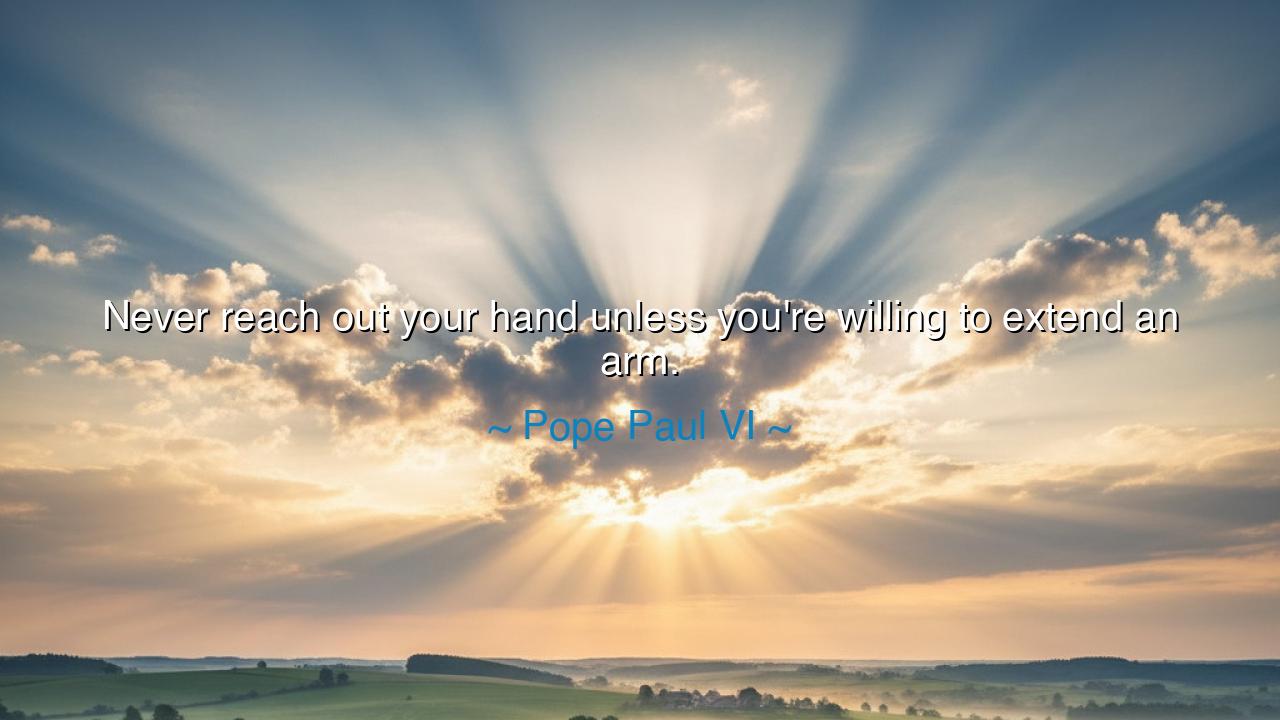
Never reach out your hand unless you're willing to extend an






Commitment is the heart of true service. When Pope Paul VI declared, “Never reach out your hand unless you're willing to extend an arm,” he spoke of the sacred duty that comes with offering help. A hand symbolizes a small gesture—a token of goodwill or comfort. But to extend an arm is to give fully, to commit deeply, and to bear the weight of another’s burden. His words warn against empty promises and shallow acts of charity. If one offers aid, it must be with the courage to follow through completely, even when it demands sacrifice.
This teaching springs from the eternal truths of compassion and responsibility. Too often, people offer symbolic kindness—words of comfort, fleeting gestures—without truly engaging with the suffering of others. Pope Paul VI, who guided the Church during a turbulent time of social and spiritual upheaval in the mid-20th century, understood that true love and service demand more than appearances. His message was not only for the faithful but for all humanity: if you dare to reach toward another, do so with your whole heart and strength, for partial help can sometimes harm more than it heals.
History provides vivid examples of this principle. Consider the efforts of Florence Nightingale during the Crimean War. She did not simply extend a hand with kind words to wounded soldiers; she devoted her entire life and body to their care, revolutionizing medical practices and bringing dignity to those who had been abandoned. Had she given only partial effort, countless lives would have been lost. Her legacy reflects the truth of Pope Paul VI’s teaching: when you choose to help, you must be willing to go all the way.
The opposite is also seen in times of betrayal. In moments of famine or disaster, nations have sometimes promised aid but delivered only scraps, leaving the suffering worse than before. Such actions reveal the danger of offering a hand without extending an arm. False hope can crush the spirit more deeply than silence. Better not to reach at all than to extend only a fragment of care, for broken promises corrode trust and sow despair.
On a personal level, this wisdom speaks to our daily lives. In friendships, family, and community, we are often given chances to help others. A shallow, half-hearted gesture may soothe our conscience, but it rarely lifts another soul from hardship. To truly serve, we must step into discomfort, giving our time, energy, and sometimes even our safety. This is the path of the selfless, the way of those who understand that love is measured not by intention but by action.
Let this lesson be passed through the ages: do not offer what you are unwilling to fulfill. If you reach forth your hand, let it be with strength, courage, and wholeness. For in giving fully, you reflect the divine compassion that binds humanity together. And in such wholehearted service, you will find not only the salvation of others but also the noble purpose of your own life.






Vvu
For products and services, it’s a caution about promises. Opening a support channel, beta program, or emergency hotline signals availability; under-resourcing it breeds cynicism. I’m drafting a reliability policy: explicit SLA tiers, queue caps that trigger waitlists, escalation rules, and authority to refund or prioritize fixes when impact is severe. What leading metrics catch over-promising—first-response time variance, backlog age, or churn after unresolved tickets? Better to narrow the offer than bait users with attention we can’t extend when complexity arrives.
NTNgoc Trung
Applied to relationships, it reads like a test of sincerity. If I initiate reconciliation, am I prepared for uncomfortable conversations, changed routines, and the slow rebuild of trust? A practical checklist helps: craft an apology that identifies harm without excuses, set clear boundaries, propose tangible repairs, and agree on a review date. What if the other person needs more than I can carry—therapy, joint logistics, family mediation? I’d rather admit limits early than spark hope I can’t sustain. How do you gauge readiness honestly?
KNkhanhvan nguyentran
In community work, light-touch gestures look good on social feeds but create dependency if we vanish when things get hard. I want a sustainable pledge format: specify time and budget ceilings, name what I can reliably do (transport, forms, childcare), and pair with someone local for continuity. Could we normalize “declining with care” when capacity is low, instead of promising and ghosting? Also, how do I guard against savior instincts—centering the person’s plan, not my idea of rescue, when stakes escalate?
TVTran Ngoc Thao Vy
As a manager, this feels like a warning against drive-by mentorship. Offering to “help” a colleague should imply real follow-through: time on calendars, feedback on drafts, and willingness to shoulder some risk if the project wobbles. Before I volunteer, I’m trying a quick commitment test: 1) Define scope and exit conditions; 2) Estimate the true cost in hours and political capital; 3) Agree on an escalation path if stakes rise. What signals show I’m actually ready—versus chasing the glow of being helpful without substance?